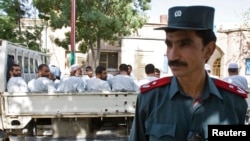ISLAMABAD —
An Afghan presidential investigative commission has confirmed that Afghan police and security officials are torturing detainees, despite promises of reform. But the head of the commission denies statements by the United Nations that torture and ill-treatment are systematic in Afghan detention centers.
Commission head Abdul Qadir Adalatkhwa acknowledges that almost half of the people they interviewed said they had been tortured and even more said they had no access to defense lawyers. He says members of the delegation confirm the existence of torture, mistreatment, beatings and threats that occurred mostly during the arrest of detainees or during interrogations.
But Adalatkhwa says his commission's two-week fact-finding mission did not find evidence to support a recent U.N. report saying there were systematic, widespread abuses of conflict-related detainees in Afghan custody.
The U.N. report, released in January, concluded that torture was an institutional policy or practice and not just used by a few individuals in isolated cases.
It says U.N. interviewers had seen injuries, marks and scars consistent with torture and ill-treatment, including prolonged beatings, electric shocks and hangings by the wrists.
Georgette Gagnon, one of the authors of the U.N. report, says the findings of the presidential commission represented the first recognition of torture in Afghan detention facilities.
"Admitting there is a very serious problem is a very good first step," Gagnon noted. "But the next step is action and, in our view, prosecution of officials who are committing torture."
The U.N. report also says of the 105 child detainees they interviewed, 80 of them had experienced torture or ill-treatment.
During the one-year period that the United Nations conducted its investigations, it noted a decrease in the number of allegations of torture in National Directorate of Security facilities during the period. That was a period when there were fewer transfers from international military forces and increased monitoring by those same forces. But once International Security Forces in Afghanistan resumed transfers and reduced monitoring, there was an increase in torture incidents.
Gagnon says human rights advocates are concerned this kind of oversight and pressure will be cut back once international forces leave in 2014.
"There are concerns, certainly among Afghan communities, Afghan legal aid lawyers, Afghan women, Afghan NGOs [non-governmental organizations], also officials within the Afghan government, that without sustained international support, the gains made certainly on human rights will either diminish or certainly not be advanced," she said.
President Hamid Karzai is to discuss the commission's findings with the judiciary board, his top legal advisory body, Wednesday.
The United Nations says its investigation covered a one-year period from 2011 to 2012 and was based on multiple interviews of officials and detainees in 89 facilities across 30 provinces.
Commission head Abdul Qadir Adalatkhwa acknowledges that almost half of the people they interviewed said they had been tortured and even more said they had no access to defense lawyers. He says members of the delegation confirm the existence of torture, mistreatment, beatings and threats that occurred mostly during the arrest of detainees or during interrogations.
But Adalatkhwa says his commission's two-week fact-finding mission did not find evidence to support a recent U.N. report saying there were systematic, widespread abuses of conflict-related detainees in Afghan custody.
The U.N. report, released in January, concluded that torture was an institutional policy or practice and not just used by a few individuals in isolated cases.
It says U.N. interviewers had seen injuries, marks and scars consistent with torture and ill-treatment, including prolonged beatings, electric shocks and hangings by the wrists.
Georgette Gagnon, one of the authors of the U.N. report, says the findings of the presidential commission represented the first recognition of torture in Afghan detention facilities.
"Admitting there is a very serious problem is a very good first step," Gagnon noted. "But the next step is action and, in our view, prosecution of officials who are committing torture."
The U.N. report also says of the 105 child detainees they interviewed, 80 of them had experienced torture or ill-treatment.
During the one-year period that the United Nations conducted its investigations, it noted a decrease in the number of allegations of torture in National Directorate of Security facilities during the period. That was a period when there were fewer transfers from international military forces and increased monitoring by those same forces. But once International Security Forces in Afghanistan resumed transfers and reduced monitoring, there was an increase in torture incidents.
Gagnon says human rights advocates are concerned this kind of oversight and pressure will be cut back once international forces leave in 2014.
"There are concerns, certainly among Afghan communities, Afghan legal aid lawyers, Afghan women, Afghan NGOs [non-governmental organizations], also officials within the Afghan government, that without sustained international support, the gains made certainly on human rights will either diminish or certainly not be advanced," she said.
President Hamid Karzai is to discuss the commission's findings with the judiciary board, his top legal advisory body, Wednesday.
The United Nations says its investigation covered a one-year period from 2011 to 2012 and was based on multiple interviews of officials and detainees in 89 facilities across 30 provinces.





